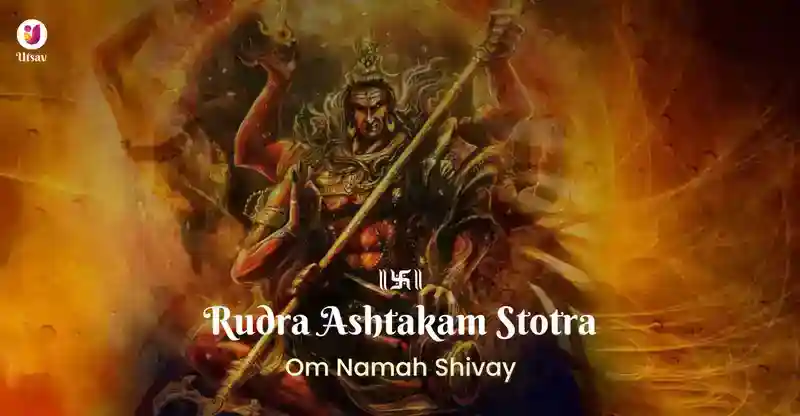Rudra Ashtakam Stotra - Complete meaning and benefits of chanting
Fri - Mar 29, 2024
5 min read
Share
Rudra Ashtakam is a powerful hymn composed of eight verses glorifying Lord Shiva, also known as Rudra, the destroyer of evil and embodiment of cosmic energy. It praises Shiva's various attributes, including his fierceness, benevolence, and omnipresence, invoking blessings for spiritual growth and protection from worldly afflictions. Devotees recite this stotra with reverence, seeking liberation from the cycle of birth and death and ultimate union with Shiva's divine consciousness.

Stotra
Namāmīshamīshān nirvāṇ rūpan, vibhuan vyāpakan brahma vedah svarūpam ।
Nijan nirguṇan nirvikalpan nirīhan, chidākāsh mākāshavāsan bhaje’ham ॥
Nirākār moankār mūlan turīyan, girājnyān gotītamīshan girīsham ।
Karālan mahākāl kālan kṛupāluan, guṇāgār sansār pāran nato’ham ॥
Tuṣhārādri sankāsh gauran gabhīran, manobhūt koṭi prabhā shrī sharīram ।
Sfuranmauli kallolinī chārū gangā, lasadbhāl bālendu kaṇṭhe bhujangā॥
Chalatkuṇḍalan shubhra netran vishālan, prasannānanan nīlakaṇṭhan dayālam ।
Mṛugādhīsh charmāmbaran muṇḍamālan, priya shankaran sarvanāthan bhajāmi ॥
Prachaṇḍan prakaṣhṭan pragalbhan pareshan, akhaṇḍan ajan bhānu koṭi prakāsham ।
Trayashūl nirmūlanan shūl pāṇian, bhaje’han bhavānīpatian bhāv gamyam ॥
Kalātīt kalyāṇ kalpāntakārī, sadā sachchinānda dātā purārī।
Chidānanda sandoh mohāpahārī, prasīd prasīd prabho manmathārī ॥
N yāvad umānāth pādāravindan, bhajantīh loke pare vā narāṇām ।
N tāvad sukhan shāanti santāp nāshan, prasīd prabho sarvan bhūtādhi vāsan ॥
N jānāmi yogan japan naiv pūjā, n to’ham sadā sarvadā shambhū tubhyam ।
Jarā janma duahkhaugh tātapyamānan, prabhopāhi āpannāmāmīsh shambho ॥
Stotra with meaning
Namāmīshamīshān nirvāṇ rūpan, vibhuan vyāpakan brahma vedah svarūpam ।
Nijan nirguṇan nirvikalpan nirīhan, chidākāsh mākāshavāsan bhaje’ham ॥
O Shiva, the form of salvation, the omnipresent, the all-pervasive Brahma, the form of Vedas, the God of the north-east direction and the master of all, I salute you.
Nirākār moankār mūlan turīyan, girājnyān gotītamīshan girīsham ।
Karālan mahākāl kālan kṛupāluan, guṇāgār sansār pāran nato’ham ॥
Shiva, situated in his own form, without any distinction, without any desire, conscious, in the form of the sky, I salute you. Formless, the origin of Omkar, the Turiya voice, beyond knowledge and senses, the lord of Kailash, the fierce, the time of Mahakaal, the kind, the abode of virtues, I salute the Supreme Lord beyond the world.
Tuṣhārādri sankāsh gauran gabhīran, manobhūt koṭi prabhā shrī sharīram ।
Sfuranmauli kallolinī chārū gangā, lasadbhāl bālendu kaṇṭhe bhujangā॥
His body was white and deep like a snow mountain, and he had a million radiances of the mind.
The beautiful Ganga with her sparkling crown and her waving hair, the shining beard of the young moon and the serpent around her neck.
Chalatkuṇḍalan shubhra netran vishālan, prasannānanan nīlakaṇṭhan dayālam ।
Mṛugādhīsh charmāmbaran muṇḍamālan, priya shankaran sarvanāthan bhajāmi ॥
He had moving earrings, white eyes, large, cheerful face, blue throat and kindness.
O lord of the deer, I worship that dear Lord Śiva, who is dressed in leather and wears a garland on his head.
Prachaṇḍan prakaṣhṭan pragalbhan pareshan, akhaṇḍan ajan bhānu koṭi prakāsham ।
Trayashūl nirmūlanan shūl pāṇian, bhaje’han bhavānīpatian bhāv gamyam ॥
The tremendous, the bright, the proud, the Lord of the Supreme, the unbroken, the unborn, the millions of suns, the light.I worship the Lord of the goddess Bhavānī, who eradicates the three tridents and who holds a trident in his hand.
Kalātīt kalyāṇ kalpāntakārī, sadā sachchinānda dātā purārī।
Chidānanda sandoh mohāpahārī, prasīd prasīd prabho manmathārī ॥
Transcendental welfare, the end of the age, always the giver of true bliss, Purari.
O bliss of consciousness, destroyer of doubt and delusion, please be merciful, O Lord, please be pleased with me.
N yāvad umānāth pādāravindan, bhajantīh loke pare vā narāṇām ।
N tāvad sukhan shāanti santāp nāshan, prasīd prabho sarvan bhūtādhi vāsan ॥
No one in this world or in the next worships the lotus feet of Lord Umānatha.
There is no such thing as happiness, peace or the destruction of distress. Please, Lord, be pleased with all living beings.
N jānāmi yogan japan naiv pūjā, n to’ham sadā sarvadā shambhū tubhyam ।
Jarā janma duahkhaugh tātapyamānan, prabhopāhi āpannāmāmīsh shambho ॥
I do not know yoga, nor do I know chanting, nor do I know worship, nor do I always always, Lord Śambhu, offer You.O Lord Śambho, please protect me from the flood of old age and birth.
Benefits of Rudra Ashtakam Stotra
Chanting or reciting the Rudrashtakam is believed to bring several benefits are as follows
1. Removal of Obstacles
2. Protection from Negativity
3. Healing and Well-being
4. Fulfillment of Desires
5. Endowment of Divine Grace
Overall, the Rudrashtakam is revered for its profound spiritual significance and its ability to invoke the divine presence of Lord Shiva. Devotees chant it with faith, devotion, and reverence to seek blessings, protection, and spiritual growth from the Lord.
How to chant the stotra?
Before chanting the Shiv Raksha Stotra, here are some traditional practices that devotees may follow to prepare for a more focused and meaningful experience:
Inner Cleanliness: Take a bath or wash your hands and face to feel physically clean. This can symbolize inner purification as well.
Peaceful Environment: Find a quiet, clean space free from distractions where you can focus on the chanting.
Simple Attire: Wear comfortable and clean clothes that allow you to sit comfortably.
Devotional Mindset: Approach the chanting with reverence and devotion to Lord Shiva. Set an intention for your chanting, whether it's seeking protection, peace, or spiritual growth.
Prayer (Optional): You can offer a short prayer to Lord Shiva before chanting, expressing your gratitude and seeking his blessings.
Who can chant Rudrashtakam Stotram & When to chant?
Anyone can chant the Rudrashtakam Stotram regardless of their background.
It can be recited at any time, but it's often chanted during morning or eveningprayers, on Mondays (considered auspicious for Lord Shiva), or during times of distress to seek blessings, protection, and spiritual upliftment from Lord Shiva.
Share